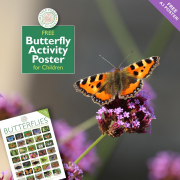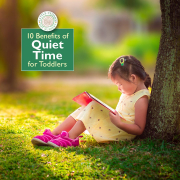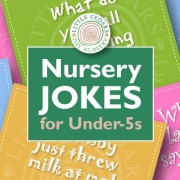A Guide to January’s Big Garden Birdwatch – Children Get Ready!
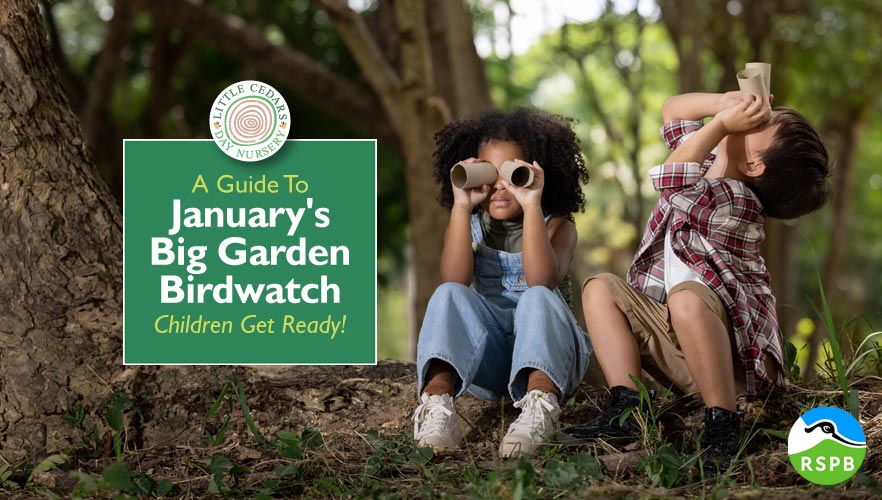
 Parents and children, don’t miss this year’s incredibly important birdwatching activity for the RSPB — and the planet — which occurs from Friday 26th to Sunday 28th January. The Big Garden Birdwatch only takes one hour, is free, and is an extremely worthwhile activity for children and families to take part in. It’s a great way to introduce children to the concept of conservation as well as getting them interested in spending time in and around nature. And, as we’ve reported before, nature is extremely good for children! In today’s post, we explain how easy it is to get your little ones involved and why taking part is a win-win-win for families, birds and nature.
Parents and children, don’t miss this year’s incredibly important birdwatching activity for the RSPB — and the planet — which occurs from Friday 26th to Sunday 28th January. The Big Garden Birdwatch only takes one hour, is free, and is an extremely worthwhile activity for children and families to take part in. It’s a great way to introduce children to the concept of conservation as well as getting them interested in spending time in and around nature. And, as we’ve reported before, nature is extremely good for children! In today’s post, we explain how easy it is to get your little ones involved and why taking part is a win-win-win for families, birds and nature.
What is the Big Garden Birdwatch?
The Big Garden Birdwatch began in 1979 and happens annually. It is the biggest garden wildlife survey in the world, each year attracting hundreds of thousands of participants up and down the length of the UK. 9.1 million birds were reported in last year’s count.
In essence, people get involved simply by choosing an outdoor patch, and then counting birds that land there during the course of an hour. They then report their findings to the RSPB. We’ll cover a bit more detail on how to go about that later in this article.
Why Does the Big Garden Birdwatch Matter?
 Monitoring populations of bird species every year allows the RSPB and other conservation organisations to see how the various types of garden birds are faring. Whether or not they’re doing well will be a barometer of the state of nature itself as well as that of the individual bird populations. If the RSPB and other conservation organisations can see a problem, they can then mobilise to try to do something about it. Likewise, if they see a particular bird species doing well, they can learn from that and better understand what measures are helping that particular bird population to thrive.
Monitoring populations of bird species every year allows the RSPB and other conservation organisations to see how the various types of garden birds are faring. Whether or not they’re doing well will be a barometer of the state of nature itself as well as that of the individual bird populations. If the RSPB and other conservation organisations can see a problem, they can then mobilise to try to do something about it. Likewise, if they see a particular bird species doing well, they can learn from that and better understand what measures are helping that particular bird population to thrive.
Nature is also incredibly good for children, helping them cognitively, academically, spiritually, mentally, socially, creatively and physically. Spending time in nature has also been shown to improve test results, lower stress levels and even improve earning potential. Learn more about the amazing benefits of nature to children here or, better still, get them involved in the Big Garden Birdwatch this January!
What Sort of Discoveries Has the Annual Big Garden Birdwatch Uncovered?
Each year, the Big Garden Birdwatch uncovers intriguing and useful data about how bird species in the UK are faring. For example:
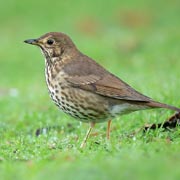 In 2023, the bird species spotted the most was the House Sparrow, followed by the Blue Tit in second place, Starling in third, Wood Pigeon in fourth and Blackbird in fifth.
In 2023, the bird species spotted the most was the House Sparrow, followed by the Blue Tit in second place, Starling in third, Wood Pigeon in fourth and Blackbird in fifth.- Despite that, historical data from the count shows that even House Sparrow numbers have significantly declined — by 57% — since the count began in 1979.
- Song Thrush populations are 80% lower than they were when the survey began.
- Indeed, during the last 6 decades, data suggests that bird populations in the UK have dropped by over 38 million, a huge and worrying number.
How Families & Children Can Take Part in the Big Garden Birdwatch
There are 4 simple steps required to take part in the Big Garden Birdwatch this January:
- Register free, via the RSPB website.
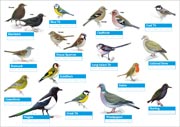 By registering you’ll also get a free guide to taking part in the event, which includes visual reference to the birds to look out for, as well as other perks like a discount on bird food and other bird feeding supplies available from the RSPB’s online shop.
By registering you’ll also get a free guide to taking part in the event, which includes visual reference to the birds to look out for, as well as other perks like a discount on bird food and other bird feeding supplies available from the RSPB’s online shop. - Choose a suitable outdoor patch to monitor during the survey event. It could be your garden, patio, local park, or even a view from a balcony will do.
- Between Friday 26 and Sunday 28 January 2024, count how many birds of each species, actually land in your patch during the hour’s monitoring.
- Once complete, confirm the biggest number of each bird species that has landed at any one time to the RSPB, along with the location of your patch. Please still confirm your findings even if you saw no birds land at all. Make your submissions online here between 26 January and 18 February 2024.
Children can take part individually or as part of a group. They can also undertake more than one birdwatching hour, and submit more than one set of results, so long as they do so from a different location (‘patch’) in each case. The RSPB guide gives more details about each step, so do ensure you visit the RSPB’s Big Garden Watch web area to get familiar with what’s required and to access your free guide.
Keen to Attract More Birds for Your Count?
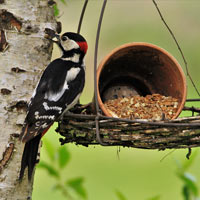 If you’re keen to attract as many birds as possible to your Garden Birdwatch count, the RSPB has you covered. As well as providing useful tips on how to attract birds on their website, they also offer those taking part in the Big Garden Birdwatch a 15% discount on bird food and easy-to-clean bird feeders from their online shop. Delivery is also free to participants. Follow the bold links for more information.*
If you’re keen to attract as many birds as possible to your Garden Birdwatch count, the RSPB has you covered. As well as providing useful tips on how to attract birds on their website, they also offer those taking part in the Big Garden Birdwatch a 15% discount on bird food and easy-to-clean bird feeders from their online shop. Delivery is also free to participants. Follow the bold links for more information.*
* (Details are given in good faith and are understood to be correct at the time of going to press. However, 3rd party offers are beyond our control and, as such, may be subject to change without notice).
Little Cedars Day Nursery in Streatham
High-Quality Childcare in Streatham, London, SW16

 We hope your little ones have fun getting involved in this year’s Big Garden Birdwatch — they’re sure to enjoy the nature-based activity as they take their first step towards becoming little citizen scientists. It’s hugely worthwhile for the birds and ecology and, as we know at Little Cedars Day Nursery, nature is hugely beneficial to children too.
We hope your little ones have fun getting involved in this year’s Big Garden Birdwatch — they’re sure to enjoy the nature-based activity as they take their first step towards becoming little citizen scientists. It’s hugely worthwhile for the birds and ecology and, as we know at Little Cedars Day Nursery, nature is hugely beneficial to children too.
If you are looking for high-quality childcare services in or near Streatham, do consider Little Cedars Day Nursery. Ofsted rates us as a good provider of early years education and childcare and we represent a wonderful start to children’s early years. We bring out the very best in every child and prepare them well to ensure readiness for school when they leave us around the age of five. We support various childcare funding schemes too, making our childcare service even more affordable for eligible families.
To request a place for your child at Little Cedars Day Nursery in Streatham, or to find out more, please get in touch using one of the following options:
Our Streatham nursery and preschool is close to Tooting Common, Tooting, Streatham Hill, Streatham Park, Streatham Common, Furzedown, Tooting Bec, Tooting Broadway, Balham, Norbury and Colliers Wood, so may also suit families in those nearby locations.


